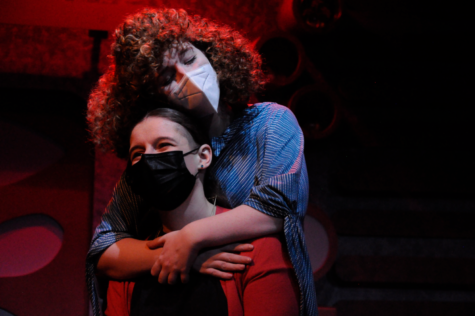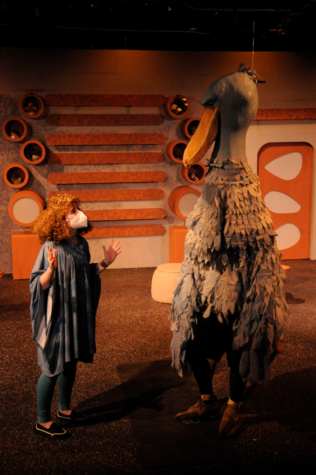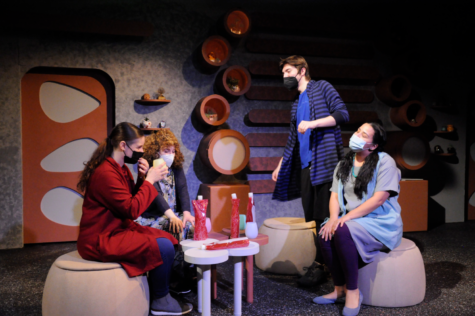Babel, a not so Dystopian Dystopia
March 12, 2022
“In the not-so-distant and not-too-dystopian future…” Thus begins the description of “Babel,” by Jacqueline Goldfinger, which premiered at the Stage Center Theater on Feb. 24 and was directed by Communication, Media and Theater (CMT) faculty member Dan Wirth. This is a rather shocking, and even alarming, way of starting to talk about a dystopian world—something that sounds almost like a warning about the near future and what technological progress may hold for humanity.
“Babel” presents a picture that is not completely unknown to us—a world in which technology and science are used as tools for controlling, monitoring, and segregating people. In this world, not everyone is equal. “The certified” are the privileged class who, having been tested on countless occasions, have proven to be carriers of the highest genetic standards that accredit them as the “most suitable” for society. The problem: although scientific knowledge allows us to determine the genetic quality of each individual, each new life is a lottery where a random cocktail of genes is mixed without any certainty that this combination will be accepted. Those who do not meet the genetic standards are a breed of nameless—who, in different scenes, are referred to as “Them” by the characters. They live in underground villages and do the lowest jobs without coming into contact with “the certified.”

On the stage, we see how two couples, Dani and Renee, and Ann and Jamie, face the challenge of being parents and, above all, passing the pre-certification test. Voted and approved by referendum, the pre-certification test qualifies the genetic material of the new life in three aspects: physical, cognitive and behavioral. If any of these parameters are evaluated as deficient, it is “recommended,” by the weight of both law and social pressure, to “take the shot” and terminate the pregnancy.

With a masterful performance by Marti Stump, after not having passed the test, Renee debates between obeying the law or continuing her pregnancy on the margins of society. With each of their movements on stage, they transmit the tension and anguish of being in such a situation, and give the play its title when recalling the Biblical story of Babel wondering if they are playing gods and, if so, if they are doing the right thing.
In the role of Dani, Elizabeth Sacha gives life to Renee’s partner, an ideal citizen who is committed to duty, but at the same time Dani, “who is always right,” shows us the darkest face in the search for perfection. On the other side of the coin, violence and intimidation are the tools used to create the illusion that nothing is out of place. Sacha performs a brilliant interpretation of Dani, managing with ease her bipolar turns from affability to anger and rage.
Ann, played by Angelique Velazquez, is a character full of insecurities who constantly seeks Dani’s advice and approval and who bows to what is socially accepted. She is torn between fear and a sense of duty. Her decisions are questioned by Jamie, her partner played by Luke Steadman, who also plays the role of the Giant Stork. The Stork’s appearance on stage misleads the viewer by introducing moments of comedy, but the Stork also has a vital role in the play, making it much darker than might be expected. With a “Black Mirror” style twist, the Stork shows to what extent the characters are being controlled and manipulated. Steadman does an exceptional job as Jamie, a character who covertly defies the norm, and even more so under the guise of the Stork, eliciting laughs and connecting with a room at half capacity.
Regarding the sets, props and costume design, the versatility of the spaces created and the coherence of the aesthetics with the text are surprising. The style is reminiscent of the idea of the future from the 60s, a kind of retro-futuristic style in the decorations, like Charles Schridde’s illustrations for Motorola advertisements. On the other hand, the clothing with its hippie, ecological and minimalist air fits perfectly with the decoration and the idea of a future society that is not too far in time.

As the curtain falls and thunderous applause, the viewer leaves the room with more questions than answers. With a lot to think about and to digest, even with a certain feeling of unease. In this sense, it was an appropriate decision of the director to give rise to a small colloquium after the performance that allowed the audience to share opinions and delve into the different topics that are dealt with in the world of Babel, as well as to reflect on the suggestive question that forms the backbone of the play: “How far will we go to perfect being human before we realize we’ve lost our humanity?”







